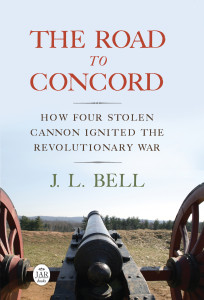
J.L. Bell maintains the Boston 1775 blog about the American Revolution (www.boston1775.net). He is also the author of a new book called The Road to Concord: How Four Stolen Cannon Ignited the Revolutionary War, which explores what exactly the redcoats wanted to find when they marched to Concord in April 1775 and what that secret reveals about the Patriot movement. Bell has published many articles on the Revolution for both scholarly and popular readers. He is an elected Fellow of the Massachusetts Historical Society and the American Antiquarian Society and a member of the Colonial Society of Massachusetts.
How did your blogging career start?
I’d developed a body of interesting material that was too small for a book or article. I began thinking about a website as a way to share those stories. The advantages of a blog were that nobody expected one to be complete at the outset and I could update it easily without requiring a 16-year-old neighbor named Jeremy as webmaster. So I launched www.boston1775.net in May 2006.
What is your scope of interest?
Living in Massachusetts, I define my field as Revolutionary New England. But last year I followed the Stamp Act riots up and down the East Coast and got as far as the Caribbean. As they say in Pirates of the Caribbean, the law is more like a guideline. If I’m interested in a story, I chase it.
How do you work?
Early on, I got into the habit of posting daily. I tend not to interview people, and, though I’m interested in material culture, I’ve never had training in that approach. I’m much better at finding and interpreting documents. Google Books is a conspiracy to make sure I never stand up from my keyboard again — there’s so much great stuff there. I have a pretty large collection of notes from archives I’ve visited, so I’m always cross-referencing.
How many followers do you have?
I have about 4,000 Twitter followers. My blog site gets 3,000 views per day and has had 3.6 million views cumulatively. The first big spike was in June 2006 when I wrote about an area of Boston called Mount Whoredom. I didn’t try to create clickbait, but it’s the internet.
Any controversies?
There have been times when people objected to a conclusion about an ancestor or hero, but that’s rare, partly because my style is to document everything.
Do you find other historians experimenting with new media?
Many. For example, Liz Covart is a historian of early America, recording interviews with other scholars and sharing them as podcasts (www.benfranklinsworld.com).
How broad is pubic interest in American history?
American history at this level is a niche interest, but, like any niche, it has fervent followers. The way media is going, it’s all niches and fervent followers. Americans are interested in parts of history they see as significant to the nation: the settlement period, the founding, the Civil War, for instance. People who write about these periods in a dramatic fashion, which doesn’t necessarily mean poorly researched, really grab a nerve.
Did you always intend to publish a book?
Because I worked full-time in book publishing until 1998, I always saw the possibility of books. Early last year, Todd Andrlik of the Journal of the American Revolution (www.allthingsliberty.com) asked me if I had an idea for a book. I said, well, yes, a proposal’s been sitting on my hard drive for years. It grew from a paper I presented at the Massachusetts Historical Society in 2001. After we made a deal, I ended up writing 12 hours a day. So I worked on The Road to Concord for 16 years or for one year, depending on how you count it.
Is the blog as a literary form here to stay?
I think we’ve passed peak blog in the culture, in the sense that people have moved on from blogs to social media, and they’ll move from social media to something else. A blog is simply a website that develops gradually and is easy to maintain. For those reasons, there will still be critical advantages in it for certain people and enterprises.
What’s next for you?
I’m scheduled into 2017 with speaking engagements since I’d like The Road to Concord to be a success. I have some ideas for a follow-up book in the same vein and am working on other projects in different formats but also based in the Revolution.
—Laura Beach




